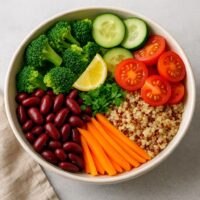The Cancer-Fighting Power of Habits
Every so often, you stumble on two articles in one day that seem to shout the same message from different rooftops. That’s exactly what happened this week—first from The Wall Street Journal, then from Precision Nutrition. The common theme? Exercise and diet aren’t just nice-to-haves when it comes to cancer. They’re powerful players in the fight.
None of this was all that surprising. As a health coach, I’ve long believed that moving more and eating better pave the way to living longer and stronger. But the latest research drives that point home with real numbers that are hard to ignore.
🎯 The Stats That Speak Volumes
Let’s start with the CHALLENGE trial presented at the American Society of Clinical Oncology (ASCO) conference. It followed colorectal cancer patients who had finished treatment. Half joined a structured, coached exercise program; the other half received general health education. After eight years:
- 37% reduced risk of death in the exercise group
- 28% fewer cancer recurrences
- 90% overall survival rate, compared to 83% in the control group

That’s not just a feel-good story—it’s a wake-up call.
And then there’s the meta-analysis published in Precision Nutrition, which pooled results from 42 studies involving nearly 47,000 adults with cancer—any type, at any stage. It found that those with the highest levels of muscle strength and cardiorespiratory fitness had significantly lower mortality rates, even in advanced stages.
Yes, you read that right: being fit helped people live longer—even with stage 3 or 4 cancer. The more fit you were, the better your odds. That’s a dose-response relationship if I’ve ever seen one.
🥦 But Wait—Food Matters Too
On the nutrition front, a study of colorectal cancer survivors revealed that diets high in inflammatory foods (think processed meats, sugary drinks, and refined carbs) led to poorer outcomes. Meanwhile, those who filled their plates with leafy greens, whole grains, and even coffee or tea fared better.
Melanoma patients undergoing immunotherapy had a 77% response rate when they followed a high-fiber diet—compared to just 29% in those with lower fiber intake.
💪 What This Means—For Everyone
Whether you’re in treatment, in recovery, or simply trying to live preventively, this research underscores something empowering: you’re not powerless.
You may not be able to control your diagnosis, but you can influence your day-to-day habits—and those matter more than we used to think.
🌿 So, What Can You Do?
Here’s the good news: you don’t have to overhaul your entire life. Start small and do what you can:
- Take daily walks.
- Add more color to your plate.
- Focus on fiber and plant-based meals.
- Strength-train a couple of times per week.
- Limit ultra-processed foods when possible.
🚶♀️ Final Thoughts 
While none of this replaces treatment, it reinforces what many of us in the health space have been saying for years: your daily choices really do matter. Better diet and consistent movement aren’t miracle cures—but they are reliable allies. Whether you’re hoping to prevent disease, support your body during treatment, or thrive after recovery, these simple habits help stack the odds in your favor.
So keep moving, keep nourishing, and remember: every step and every bite counts.
To your health,
Health Coach Carol
“That (the study results) is on par with the best treatments out there. If this (exercise) were a therapeutic, people would leave the building to go order this drug for their patients on Monday morning.”—Peter Campbell, cancer epidemiologist
“It was just so remarkable, the biological effect of exercise.”—Dr. Christopher Booth, oncologist


